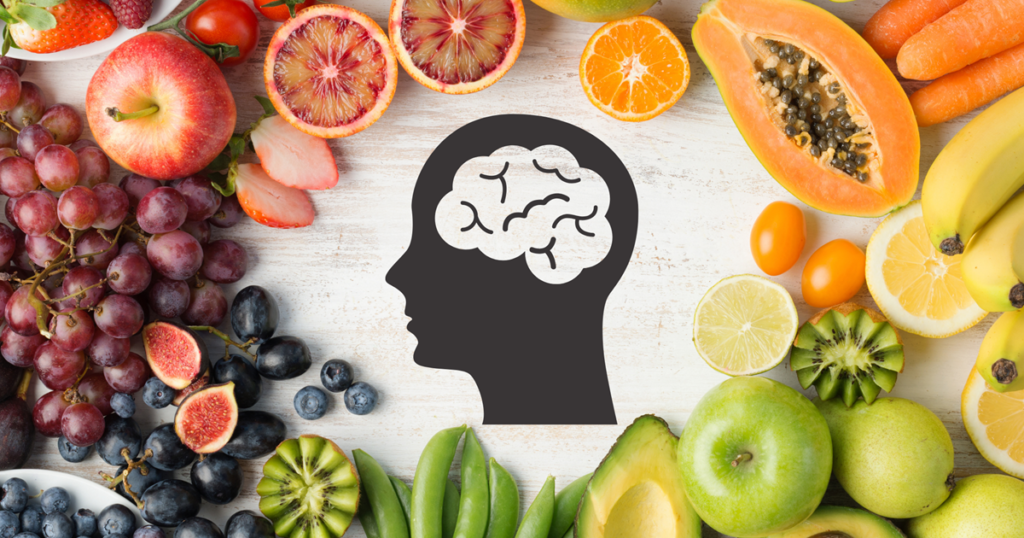Introduction
Having balanced mental health is necessary to live a satisfying life. Many people think of going to therapy or taking medication but ignore the fact that nutrition and mental health often go hand in hand. Nutrition can significantly impact the food we consume, brain activity, how we feel, and the well-being of a person. A good diet can lower stress levels, improve well-being, and even aid in the recovery process from mental health disorders like stress and depression. This blog will let you understand how diet and depression are linked, the effect of foods that boost mood and how improved dietary decisions can lead to enhanced mental health.

1. Diet & Mental Health Connection
There is a robust correlation between nutrition and mental health. The brain needs to be nourished with fundamental nutrients to work properly. In addition, a person’s dietary choices are bound to impact their emotions and thinking. Research indicates that diets high in whole foods, healthy fats, and fruits and vegetables support brain health.
Alternatively, consuming an excess of processed and sugary foods will most likely result in mental health problems, extreme fatigue, and mood swings. Compared to individuals who eat fast food, those consuming a diet with rich nutrients are observed to have lower stages of stress and depression. Diet and depression are correlated because unhealthy diets disrupt the functioning of neurotransmitters, causing an imbalance in serotonin and dopamine levels.
2. Nutrition That Improves Brain Health
It is essential to consider beneficial nutrients to the brain to improve nutrition and mental health. Such nutrients aid in relieving stress, enhancing cognitive ability and maintaining good emotional health.
- Omega-3 Fatty Acids- These essential fats assist with brain development and lower depression-related inflammation. You can found in fish, walnuts, and flaxseeds.
- B Vitamins- Supporting brain function, energy production, and cognitive ability. These nutrients can be found in eggs, greens, veggies, and dairy products.
- Magnesium- Commonly found in dark chocolate, seeds and nuts, this mineral effectively lowers stress and anxiety.
- Zinc- This vital nutrient is also found in pumpkin seeds and lentils and is vital for brain functioning and mood regulation.
- Antioxidants- Antioxidants may be suitable for mental health, especially when eating berries, green tea, and dark chocolate.
Foods that Boost Mood
Some foods that boost mood can help balance emotions and enhance cognitive clarity. These foods are packed with nutrients and are capable of improving the functionalities of the brain, thus enhancing well-being:
- Fatty Fish- Omega-3-rich salmon, sardines and mackerel boost one’s mood and lower the risk of depression.
- Dark Chocolate- An excellent source of happiness-boosting serotonin compounds.
- Berries- Strong stress and inflammation fighters owing to being packed with brain-stress shielding antioxidants.
- Nuts & Seeds- Brain-friendly nuts include almonds and walnuts, while sunflower seeds contain healthy fats and vitamins.
- Greens Leafy- Spinach, kale, and Swiss chard are excellent sources of vitamins and minerals for mental wellness.
- Whole Grains- Timely and consistent brown rice, quinoa, and oats stabilize blood sugar levels, preventing mood swings.
Incorporating these foods that boost mood can significantly help with emotional stability and sharpen the mind.
4. Processed Food & Mental Health
Planning a well-balanced diet for your mental health is not an easy task. Instead, taking in processed foods tends to make things even harder. There are undeniable relationships between diet and mental well-being. Eating a lot of packed foods, sugary snacks, and fast food is notorious for worsening signs of depression, anxiety, and even cognitive decline.
- Refined Sugar causes- Sugar is further broken down to simpler sugars, releasing energy quickly which is followed by collapse leading to tiredness and mood swings.
- Trans Fats- Obtained from fried foods and baked goods, trans fats will worsen inflammation and damage brain function.
- Artificial Additives- Different preservatives and artificial flavors negatively affect one’s mental well-being. While assistive in increasing energy levels, these additives have their long-term impacts.
- Excess Caffeine- Though it adds a slight boost in energy levels, over-intake of caffeine can trigger increased anxiety levels along with sleeping disturbances.
Cutting down on convenience food and focusing on tailored nutrition and mental health will enhance people’s moods, energy levels, and general wellness.
5. Meal Planning Tips
Planning a diet for supporting well-being must not be super complex or tedious. Here are some practical tips to aid people in planning meals for improved nutrition and mental health:
- Plan Ahead- Proper scheduling of meals can lessen the chances of turning to unhealthy food options.
- Eat a Balanced Diet- Aim to serve a proper mixture of fruits, vegetables, whole grain foods, and various proteins alongside every meal.
- Stay Hydrated- Drinking water regularly helps the brain and body operate efficiently.
- Nutritional Mindfulness- Select foods with a body-friendly nutrient profile while carefully examining how they affect well-being.
- Lower Sugar and Processed Foods Intake- Emphasize unrefined and unprocessed foods to maintain energy and mood.
- Add Probiotics- Foods such as yogurt, kefir and other fermented foods help maintain mental well-being and gut health.
Conclusion
The relationship between mental health and nutrition shows that a simple change in eating habits can dramatically uplift mood, decrease stress, and improve general well-being. Increasing depression and diet-related illnesses, among other things, highlight how we make choices about the foods we consume. Eating mood-boosting foods while avoiding highly processed alternatives and following a structured meal schedule improves well-being and helps bring mental clarity. Eating healthier foods helps achieve long-term mental wellness and improves overall health.


